Newsoms celebrate Earth Day on California farm with mugwort, Alice Waters ... and a rattler
- Oops!Something went wrong.Please try again later.
- Oops!Something went wrong.Please try again later.
- Oops!Something went wrong.Please try again later.
On Earth Day, labor leader Dolores Huerta trimmed back the withered blossoms of a mugwort at Rancho Cordova’s Soil Born Farms, breathing in the plant’s heady fragrance as she explained that you could use its leaves for a tea that helps digestion and relieves itching.
Dutch Newsom’s dad, better known as California Gov. Gavin Newsom, boasted that his 6-year-old son had shown incredible focus on his assignment as a volunteer, cutting “70 or 80” irrigation lines that the farm no longer used.
The Newsoms, Huerta and others worked up an appetite with a little volunteerism on the nonprofit interpretive farm in honor of the statewide farm-to-school initiative that Jennifer Siebel Newsom has championed in her role as California First Partner. The Farm-to-School program brings together Soil Born and other small farmers with school districts to increase the amount of whole foods that kids are getting in their diets.
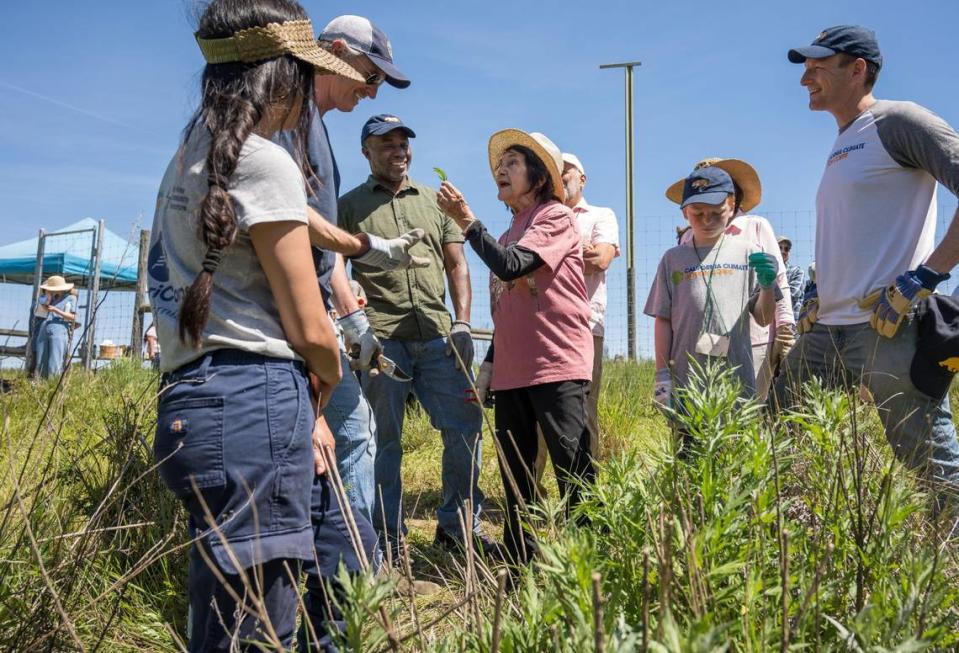
In an interview with The Bee, Siebel Newsom said it’s a win for both the earth and people when produce is grown on organic, climate-smart, regenerative farms and when local districts connect directly to local farms. Since 2021, she said, farm-to-school funding has benefited close to 1.5 million students, 163 school districts and education entities, more than 50 farms and four food hubs.
“Children deserve to be fed whole food, fresh food, organic food,” Siebel Newsom said. “There’s this connection between what we put into our body, how we treat the environment, how we grow our food, our academic performance, the local economy, and real jobs. ... I’m just excited about connecting the dots for everyone.”
After the volunteer work was over, attendees sat down to a lunch curated by Chef Alice Waters, whose Chez Panisse restaurant has won worldwide acclaim. There was carrot soup with ginger, crispy grilled chicken, beans and long-cooked collard greens with garlic, cornbread with butter and honey, and vanilla ice cream from the Straus Family Creamery.
In a speech before lunch, the culinary legend quieted all whispers as she recounted the steps that had gotten her to build her menus and her success around seasonal, local and environmentally sustainable agriculture.
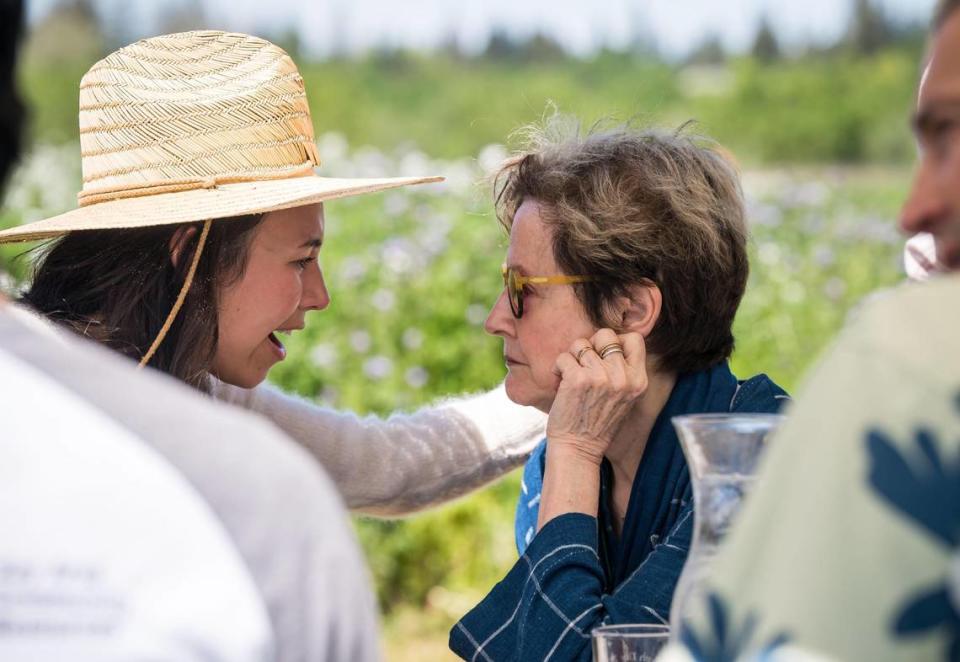
“I went to France in 1965 when it was a slow food nation, and I had that experience of tasting food in season, buying food at the farmers market standing in line for half an hour to get a hot baguette,” she said. “I experienced the immediacy of that and the beauty of that but particularly the taste, and I came back and I wanted that experience.”
Waters now also teams up with the nonprofit Conscious Kitchen to bring that experience to schoolchildren living in food-insecure neighborhoods. Sixth-grader Joaquin DaGrace of El Sobrante elicited laughter, applause and finally a standing ovation from the crowd after sharing how Walters and Conscious Kitchen had inspired a culinary awakening in him that was much like the one she had experienced in France in 1965.
“I don’t usually eat a lot of salads, but I was pleasantly surprised. It actually tasted delicious,” Joaquin said. “I told my mom all about the event and how I really wanted to eat more vegetables and (how it really got me) thinking about organics for the first time.”
Now as a Conscious Kitchen ambassador at his school, DaGrace samples meals prepared from recipes developed at the Alice Waters Institute and helps to determine whether they should be included on the school lunch menus.
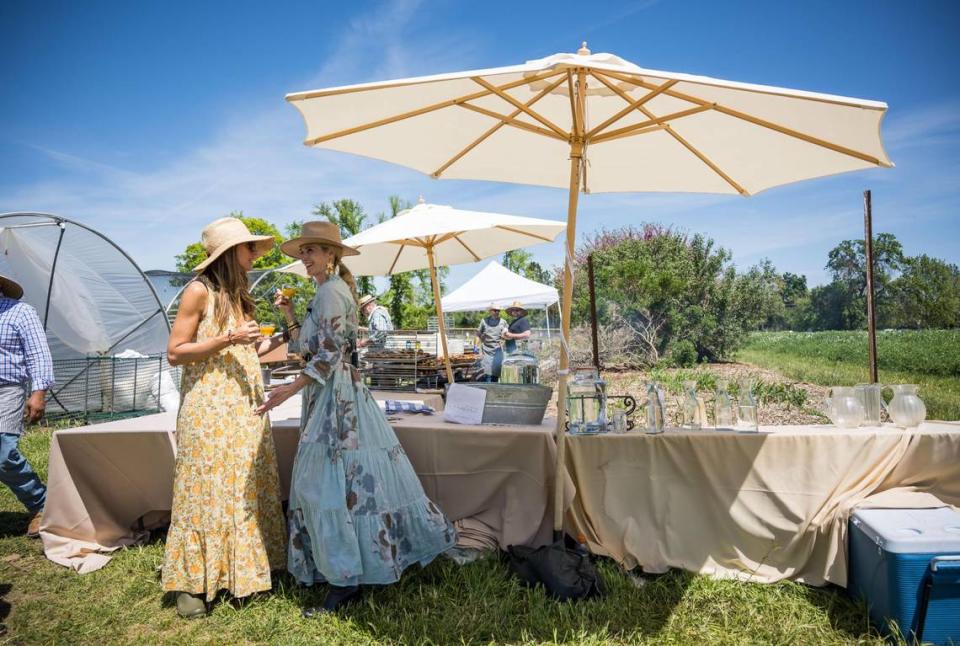
Conscious Kitchen will be able to expand its work this year to more students in Marin, Contra Costa and San Francisco counties because it received some of the grant money that Siebel Newsom urged legislators to set aside. The California Department of Food and Agriculture awarded $482,967 to the nonprofit.
Locally, Soil Born Farms is doing much the same work in partnership with Sacramento City Unified School District, and both received CDFA grants that they will implement this year.
Soil Born will use the $148,484 it’s receiving to build temporary, greenhouse-like structures called caterpillar tunnels to extend the growing period and will supply salad greens to the district, said Shawn Harrison, Soil Born’s founder and co-director. SCUSD received $466,570, state documents show, to manage cleaning, chopping and other tasks associated with making the produce edible.
While these contracts seem small, farmers said, they actually receive a better rate of return on their labor by selling produce to schools than they do in selling them to middlemen. Family farmer Anna Knight participates in the Old Grove Orange farming collaborative, supplying fresh produce to Rialto Unified School District and 24 other districts in the Inland Empire.
Farm-to-School has provided a lifeline to small farmers in her area, she said.
“We have few farmers left and those who are left have a really hard time in San Bernardino County,” Knight said. “Over 80% of farmers make less than $50,000 a year in sales. This is before labor, equipment seed. How do you continue? To give you a sense, if I sell 55 pounds of oranges to my commercial packing house, how much money do you think I see? Does anybody have a guess?”
“5%,” shouted someone in the crowd.
“5%?” Knight repeated, looking around at the faces at the table. “Less.”
She continued: “I get $1 — $1 from 55 pounds. But when I sell 40 pounds, to Rialto Unified, I keep $14 That is the power of Farm-to-School.”
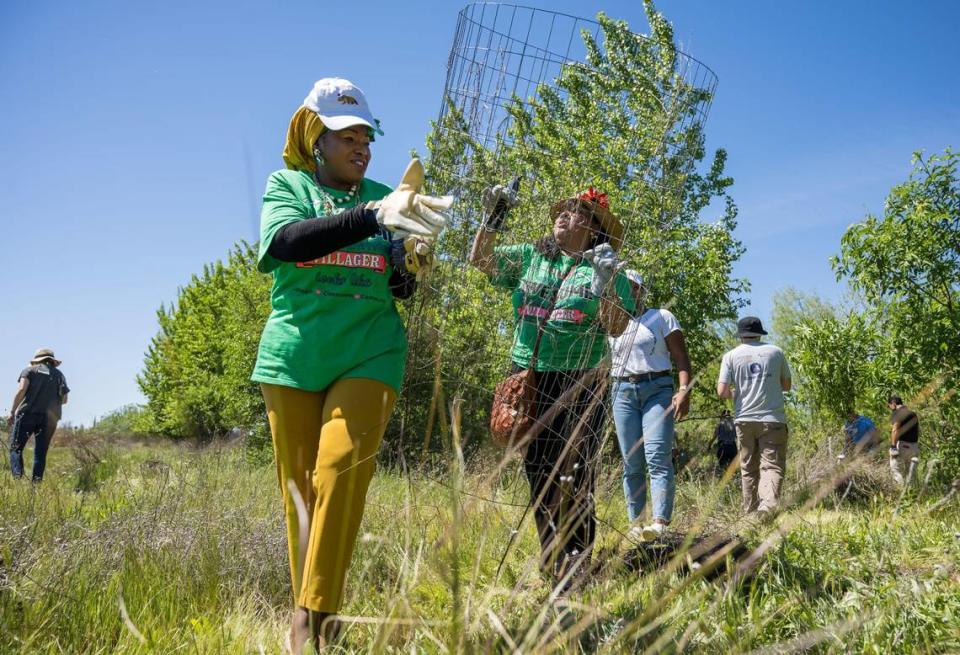
CDFA Secretary Karen Ross nodded as she listened to Knight. Most California residents would be surprised to learn that 70% of the state’s farms are less than 100 acres, Ross said, and about 89% of total farms are less than 500 acres. Farm-to-School can be an economic jumpstart for these businesses.
In the first year of the program, they offered $9 million in grants; the second year. $25 million, Ross said, and now they have awarded $60 million in grants to prove the model and get growers engaged.
They do plan to evaluate the impact of the investments, she added, and they recently hired regional navigators to begin working with district nutrition directors to identify partners. Soil Born’s Harrison said he hopes to add Folsom Cordova Unified School District since his farm lies in the district boundaries.
State Superintendent of Public Instruction Tony Thurmond said the Farm-to-School program also can help to curb the growing number of children suffering from Type 2 diabetes, obesity and heart disease.
“The message is that we can grow what our kids eat and that our kids can learn,” he said. “Today is a very important day both for being stewards of the environment, learning about climate, and even the things they can learn in science and math and history from being out here.”
A central part of the Rancho Cordova farm’s mission has been sharing approaches to crop science that eliminate the need to put more chemicals in the ground and causing problems for nearby waterways, plants and animals, Harrison said, and he and his team strive to stay on top of the latest developments in the field. Many farms continue to use techniques and products that contribute to climate change, soil erosion, water pollution and other problems, he said.
Soil Born, for instance, uses a variety of cover crops to help manage erosion, water retention, soil quality, weeds and diseases: vetch, bell beans, winter peas, alfalfa, rye, sudangrass, buckwheat and more.
Cover crops, as the name implies, cover the earth and keep an ecosystem of plant, soil and organisms under their shelter, Harrison said, and their fast, dense growth crowds out weeds. Often, the crops are left to sit on top of the land as they decompose, he said, forming a mat that prevents sunlight from germinating weeds.
The trick is to terminate the cover crop before it starts drawing a lot of nutrients out of the soil, Harrison said.
“We have a whole system about how we manage the termination of the crops,” he said. “We’re not just discing them in and turning them over. We’re mowing or grazing them, and then we actually use this system called occultation, in which we use these tarps to basically cover the mowed or grazed cover crop.”
It decomposes under the tarp, Harrison said, so the nutrients don’t get lost in the atmosphere.
“Then when we pull the tarps back, there’s beautiful soil for planting,” he said, “and we didn’t have to till it. We didn’t have to pulverize the soil. It’s all there. This beautiful soil biology is alive because we’ve been feeding it and protecting it.”
The Soil Born staff share these approaches with community residents and with school students as part of its regular programming, Harrison said, and they have enlisted state and local government agencies, community-based organizations and individual Sacramento residents in their work to restore 55 acres of the former American River Ranch.
One critical project cleaned up and restored a creek on the property where steelhead and salmon now swim and beavers are building dams, Harrison said. To jumpstart that restoration program, Soil Born had set up irrigation lines to bring water to sustain the trees and plants they had put there, Harrison said, but now, there was no longer a need for those lines. A small gallery forest of willows has sprung up along the restored waterway.
That’s why Dutch and other volunteers were charged with digging out the skinny black irrigation tubes, pruning mugwort and removing cages from plants that no longer needed the protection. Members of the California Climate Action Corps and Chief Service Officer Josh Fryday led them in their work.
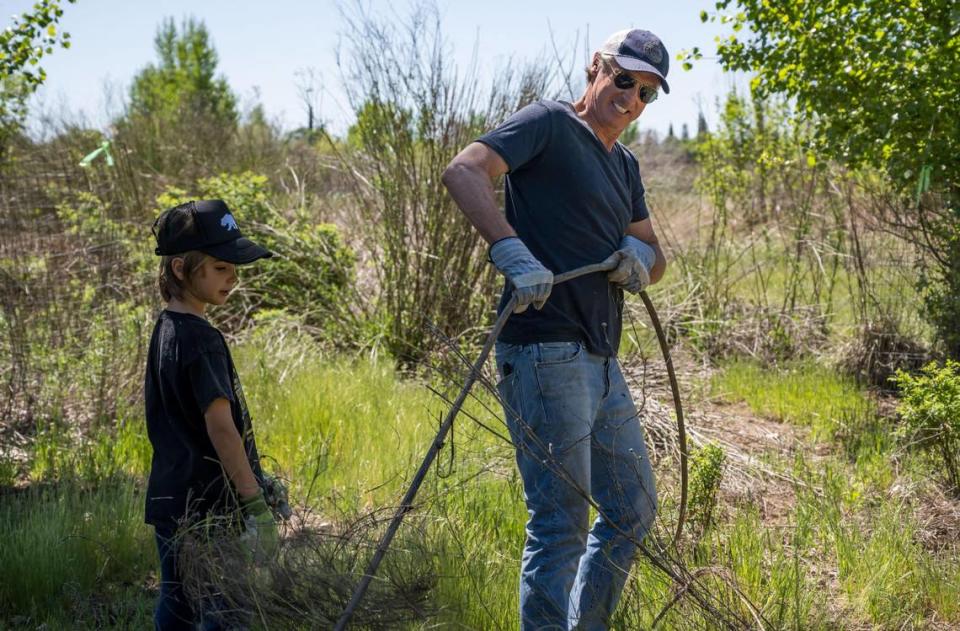
As the Newsoms and other volunteers lined up and headed out for duty, they had a fairly close encounter with a rattlesnake. Fortunately, Soil Born Farms had warned the group this could happen and had designated groundskeeper Gary Hare as snake wrangler for the day.
“There was too much commotion,” Hare said, “and he wanted to leave. I just coaxed him.”
Hare kept watch over the snake, which lay nestled in the shade of a mugwort, about 30 feet from the one Huerta was pruning.

